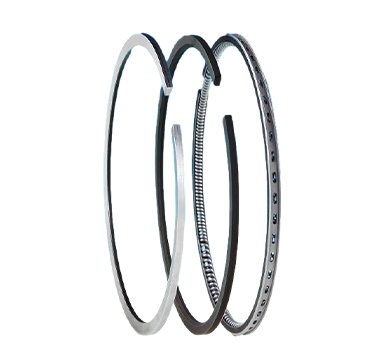What factors affect piston ring longevity?
Piston rings play a vital role in the functioning of an internal combustion engine. They maintain compression, prevent oil from entering the combustion chamber, and facilitate efficient heat transfer. However, several factors can influence the longevity and performance of piston rings. In this guide, we'll delve into these factors and provide actionable tips to ensure your engine's piston rings stand the test of time.

What factors affect piston ring longevity?
Piston rings are subject to various factors that can impact their lifespan and effectiveness. Understanding these factors is crucial for maintaining engine performance and longevity. Here's a detailed look at the key influencers:
Material Quality
The quality of materials used in manufacturing piston rings significantly affects their durability and longevity. High-quality materials such as cast iron, steel, and advanced coatings enhance resistance to wear, corrosion, and heat, thereby extending the lifespan of the rings.
Engine Operating Conditions
The operating conditions of an engine, including temperature, pressure, and speed, play a crucial role in determining piston ring longevity. Excessive heat, high RPM, and prolonged periods of operation at maximum load can accelerate wear and reduce the lifespan of piston rings.
Lubrication System
Proper lubrication is essential for minimizing friction and wear between the piston rings and cylinder walls. Inadequate lubrication or the use of low-quality lubricants can lead to increased friction, scuffing, and premature wear of the rings.
Cylinder Wall Finish
The surface finish of the cylinder walls directly impacts the performance of piston rings. A smooth and properly honed cylinder surface promotes proper ring seating and reduces friction, ensuring optimal ring longevity and engine efficiency.
Maintenance Practices
Regular maintenance, including routine inspections, oil changes, and proper tuning, is critical for preserving piston ring integrity. Neglecting maintenance tasks can result in the accumulation of deposits, increased friction, and accelerated wear of the rings.
Engine Design
The design and configuration of the engine, including the type of combustion chamber, piston design, and ring arrangement, can influence piston ring longevity. Well-engineered systems that promote efficient combustion and minimal wear contribute to extended ring lifespan.
Detonation and Pre-ignition
Detonation and pre-ignition events can exert excessive pressure and thermal stress on Automobile Piston Ring, leading to damage and reduced longevity. Proper fuel quality, ignition timing, and engine tuning are essential for preventing these harmful conditions.
Air-Fuel Mixture Quality
The quality and consistency of the air-fuel mixture directly impact combustion efficiency and piston ring performance. Proper fuel atomization, air filtration, and fuel injection systems contribute to clean combustion and reduced wear on piston rings.
Driving Habits
Driving habits, including acceleration, deceleration, and load variation, can affect piston ring longevity. Smooth, consistent driving reduces stress on the rings and promotes even wear, whereas aggressive driving can accelerate wear and compromise ring integrity.
Environmental Factors
Environmental conditions such as temperature, humidity, and altitude can influence engine performance and piston ring longevity. Extreme temperatures, moisture, and airborne contaminants can contribute to corrosion, wear, and deterioration of the rings over time.
Fuel Quality
The quality and composition of fuel used in an engine can impact combustion cleanliness and piston ring lubrication. Low-quality or contaminated fuel may contain abrasive particles, moisture, or additives that can accelerate ring wear and compromise engine performance.
Engine Cooling System
Efficient engine cooling is essential for maintaining optimal operating temperatures and preventing thermal stress on piston rings. Proper coolant circulation, radiator function, and cooling system maintenance help mitigate heat-related damage and extend ring lifespan.
Vibration and Harmonics
Excessive vibration and harmonics within the engine can contribute to premature wear and fatigue of piston rings. Proper engine balancing, vibration damping, and isolation measures help minimize stress on the rings and prolong their longevity.
Manufacturer Recommendations
Following the manufacturer's recommended maintenance intervals, service procedures, and usage guidelines is crucial for maximizing piston ring longevity. Adhering to these recommendations ensures proper engine operation and minimizes the risk of premature ring failure.
Conclusion
Ensuring the longevity and performance of piston rings is essential for maintaining the overall health and efficiency of an engine. By understanding the factors that influence ring longevity and adopting proactive maintenance practices, you can maximize the lifespan of your engine's piston rings and enjoy reliable performance for years to come.
评论
发表评论